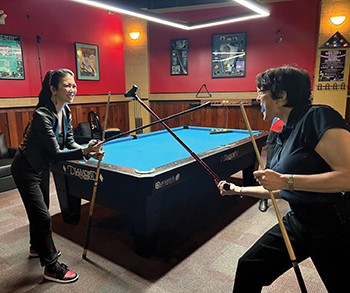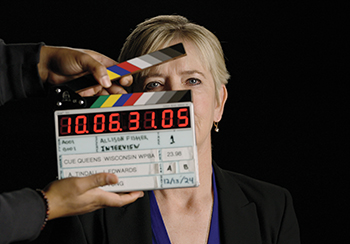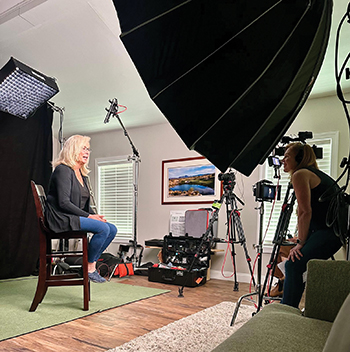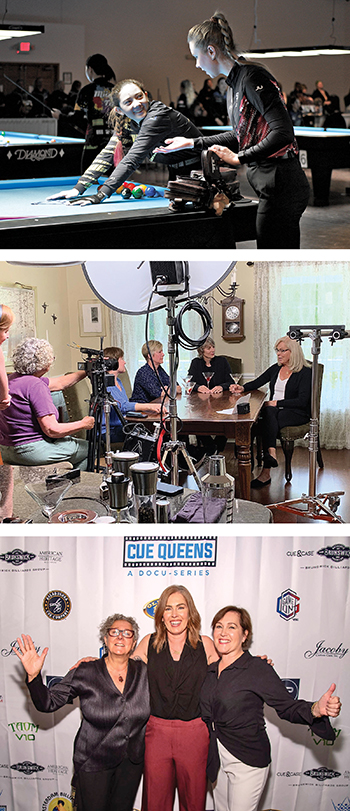


 |
 |
 |
| HomeAbout Billiards DigestContact UsArchiveAll About PoolEquipmentOur AdvertisersLinks |
|
Browse Features
Tips & InstructionAsk Jeanette Lee Blogs/Columns Stroke of Genius 30 Over 30 Untold Stories Pool on TV Event Calendar Power Index |
Current Issue
Queen's Gambit Documentary filmmaker Ashley Tindall's plans to deliver a series chronicling the struggles, advancement and ferocity of pool's top women players. By Keith Paradise The female professional pool players who competed at last month's World Games in China had a few extra pairs of eyes — and camera lenses — on them. Documentary filmmaker Ashley Tindall and her film crew made the trip across the Pacific to conduct interviews and shoot scenes for a documentary that she is working on about females in professional pool called “Cue Queens.” Her crew was on hand to film the 12 female competitors in the 10-ball competition as well as April Larson, who was competing in the 16-player mixed Heyball event. As the popularity of both pool and documentary films continues to grow, with streaming platforms and networks alike seemingly introducing new documentary projects monthly, Tindall is looking to bring the world of women's professional pool to viewers in a multi-part series. “I don't know if we are in peak documentary, but I definitely think we are in the golden era of documentary,” Tindall said. “The women are fantastic characters, and I think that there is a great way to do this long form.” Tindall is unique in that, unlike most people who have attempted to bring pool to the masses in the form of a motion picture, she did not have a background in the game when she started on the project. After starting her career in public policy, she drifted into long-form storytelling, working on programs for PBS, HBO and the National Geographic Channel. Her credits include the documentary “27 Months,” which follows three Peace Corps volunteers, and “Standing on Sacred Ground,” a film which examines indigenous people who are resisting government mega-projects, consumer culture and other modern complexities.  The documentary captures both the competitive and quirky sides of stars like Jeanette Lee (left) and Karen Corr (right). Last year, a mutual friend paired her up with British Broadcasting Company director Julie Edwards, who began telling her about a project she had started working on about British-born pool great Allison Fisher. Edwards had been reading articles about Fisher, about how she was one of the greatest players from England to ever pick up a cue stick, and her accolades and how she is now a Member of the British Empire. Edwards just had one question after reading it all. “Who is this person?” she wondered. “Why don't we know about this person?” So, Edwards began making a film about Allison and ultimately met fellow pro Kelly Fisher and English snooker player Mandy Fisher and started working on a project called, “Fisher Queens.” But, with Edwards not having access to funding or much experience in documentary filmmaking, the project ultimately got shelved. That is until she started telling Tindall about it during lunch. As Edwards peppered her with stories about what she had discovered, about the players, about the industry and about the game itself, Tindall started to get sucked in and saw an even bigger idea for the project. “Why would you limit this to just Fisher Queens?” she thought. “I want to see this entire world.” And so, she got on Zoom calls — a lot of them. With Alison and Kelly Fisher, with Kristina Tkach, Pia Filler, Margaret Styer and Karen Corr.  The Cue Queens team has already filmed hundreds of hours of interviews and behind-the-scenes action. What she found was a whole new world that she never knew existed, with a whole cast of characters that have a unique story of their own. Like Bulgaria's Kristina Zlateva, who left a career in information technology, then left her home country to relocate to the United States to pursue pool as a career. Or Kelly Fisher, who seems to have her mail forwarded to the airport as she globetrots throughout the U.S., Europe and China competing. Then there are the charter members of the Women's Professional Billiards Association like Ewa Laurance, Loree Jon Brown and Billie Billing, who paved the way for the current generation by creating the tour decades earlier. She spent time talking to the three of them not only about pool, but about the struggles of getting the WPBA off of the ground and the double standards they faced as female players a half-century ago. Lastly, there's the new generation of players, like rising young American stars Savannah Easton and Sofia Mast, who themselves have turned into a budding rivalry in just a couple of years. Tindall sat down with Easton and talked with her as well, about her hopes and dreams not just for her pool career and her future. She learned that everyone seemed to have a similar story about how they were introduced to the game — usually a parent who was a good player who taught them the basics — but that everyone had different backgrounds from different parts of the world. They heard about the struggles to earn sponsorships and the need for a social media presence. She had found a new story she wanted to tell. “Just through talking with all of them, I just felt like this was primed for a television series,” she said. “We've got tons of characters here. There is a great story about the Women's Professional Billiards Association and how it even came into existence and how they got the ESPN contract.” Then there is the current day dynamic of women's professional pool, which has probably never been more international than it is now, with the top players residing in either Asia or Europe and the Asian market luring more competitors, like Fisher and Larson, with bigger prize money in Chinese heyball tournaments.  Tindall and crew have visited players' homes. Tindall originally did not know if she could pitch this project as a sports documentary because she wasn't sure if pool would be considered a sport. She knew that pool was considered by many to be just a game that was played in bars and wondered if the women she had gotten to know could be considered athletes. Then she attended the Wausau Open, the final stop on the WPBA's calendar last year. She saw the endurance and stamina that it takes to play the game for rack after rack, match after match, for hours on end on end for multiple days. She saw the game being like a marathon, with a player on their feet for up to eight hours a day for five days, all while maintaining mental focus and stamina as well. By the time the tournament was over, her mind was made up. “It is stunning to watch that level of stamina and focus,” she said. “I came in with a bit of an assumption that maybe this is just a game. Well, I absolutely now believe that it is a sport because I've witnessed it.” Armed with a roster of characters and potential storylines, what she needed was money in order to keep filming, with the idea to edit the interviews and coverage into a sizzle reel to pitch to streaming services like Netflix and Hulu as well as networks. So, she set a goal of raising $50,000 by the end of June in order to continue filming. The project held a special fundraising event at Amsterdam Billiards that month where they auctioned off cues that had been donated to the cause and had many of the professionals — including Alison Fisher, Emily Duddy and Brown — in attendance. Two days later, the production team was at Corr's tournament outside of Philadelphia promoting the project and raising funds as well.  A fundraiser staged at Amsterdam Billiards drew more than a dozen top players and generated more than $60,000. The fund-raising effort ultimately generated more than $60,000, which allowed her to travel to China to film coverage of the World Games as well as conduct interviews with industry representatives. She also intends to shadow Kelly Fisher, with the Billiard Congress Hall of Famer traveling to Los Angeles to sit down for an interview before this year's Wausau Open. The bulk of the funds will be used for editing with Tindall hiring Felicia Livingston, who worked on the HBO show “Winning Time,” as an editor on the show. “To me, that is going to be great television because it is not just about the individual characters who can carry a show, it is about where are they going, what are the stakes in this world, and what are they up against,” said Tindall.  Capturing today' s players (top) and looking back with the women who helped build the pro game (middle) have been integral to the visions of (l-r) Edwards, Tindall and Shaw (bottom). |
Since 1978, Billiards Digest magazine has been the pool world’s best source for news, tournament coverage, player profiles, bold editorials, and advice on how to play pool. Our instructors include superstars Nick Varner and Jeanette Lee. Every issue features the pool accessories and equipment you love — pool cues, pool tables, instruction aids and more. Columnists Mike Shamos and R.A. Dyer examine legends like Willie Mosconi and Minnesota Fats, and dig deep into the histories of pool games like 8-ball, 9-ball and straight pool.
Copyright © 1997 - 2025 Billiards Digest
All Rights Reserved
Luby Publishing, Inc.
310 Busse Highway PBM #319 | Park Ridge, IL 60068
Phone: 312-341-1110 | Fax: 312-341-1469